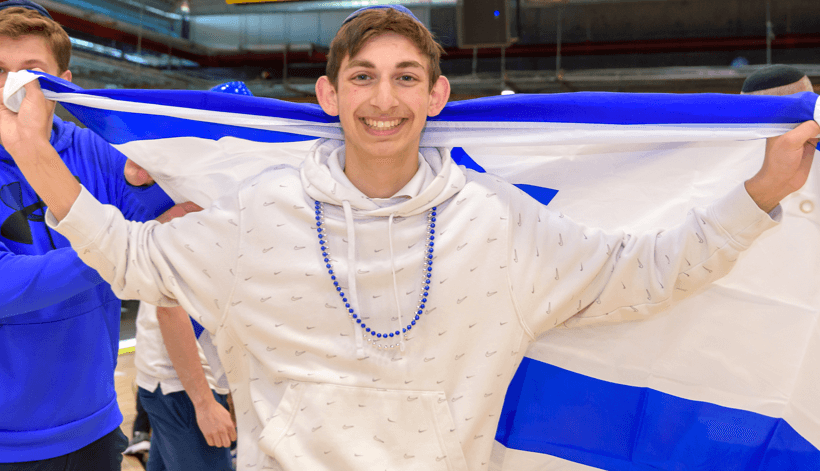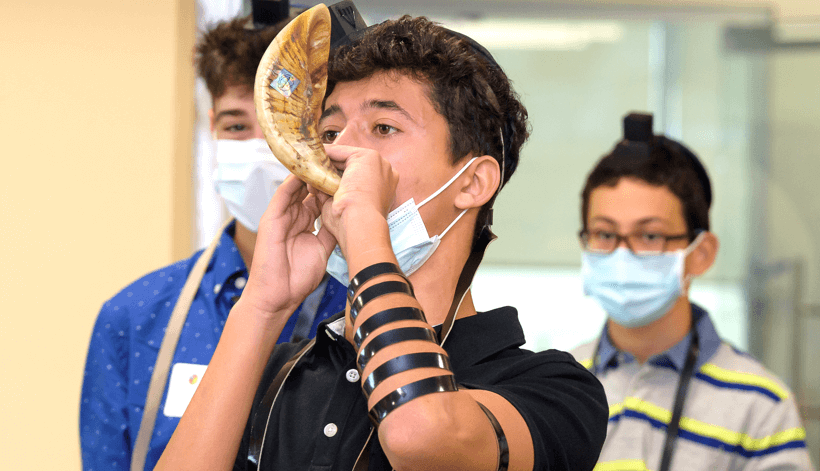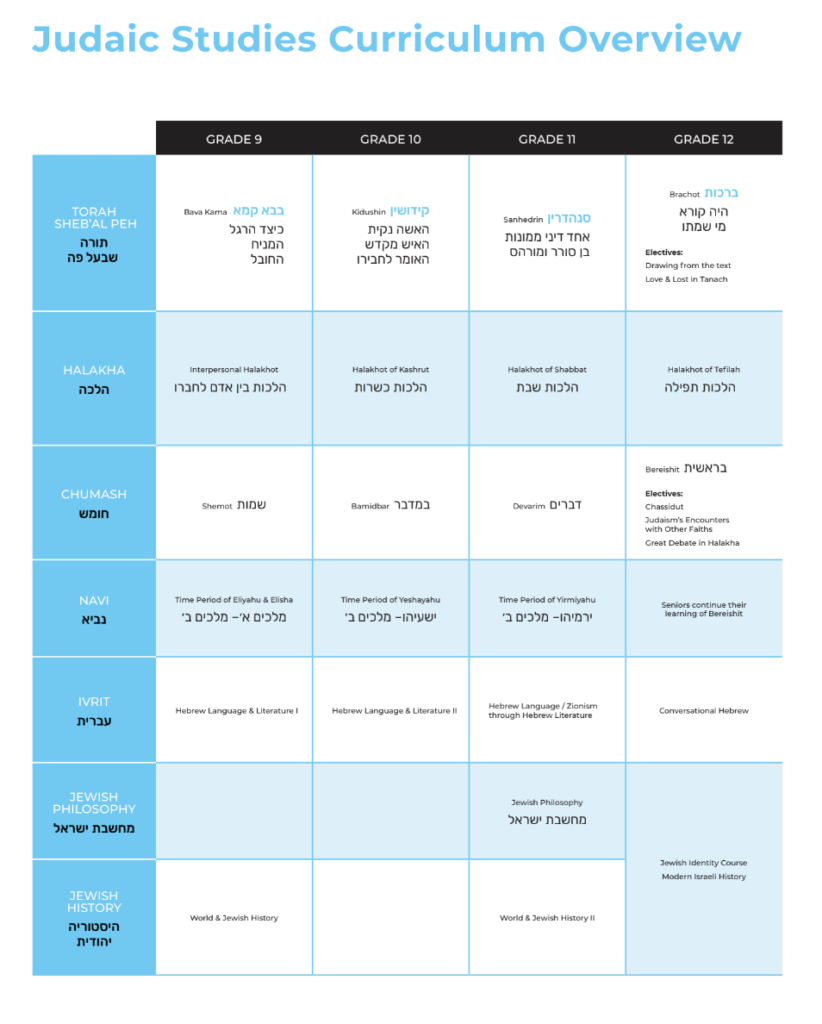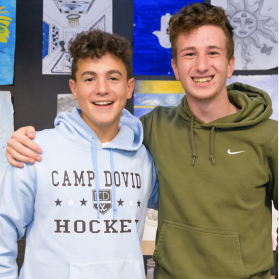Judaic Studies
תורה learning at SAR involves an authentic engagement between the student and Torah in which the student views him or herself as part of a community that has been interpreting and living according to these texts for centuries. The מסכתות גמרא and ספרי תנ“ך we study are chosen because of their ability to convey key fundamental knowledge and skills as well as raise essential questions relevant to students.
גמרא is studied with a unique integration of traditional interpretation of Talmudic debates and reflection on the issues the גמרא raises for our lives.תנ“ך study is grounded ina deep understanding of the literary structure of the פשט , enabling students to “own” and enter the discussions of traditional מפרשים.

A Focus on Skill Building.
Our curriculum is geared towards helping students acquire the skills necessary to interpret and analyze גמרא ,ך“תנ and commentaries independently. In order to become an independent learner of גמרא , students need to understand the nature of the text; what types of questions are asked, who is speaking when, when an earlier source is being marshaled, when an argument has practical consequences, and when it is a theoretical construct. תורה Sheb’al Peh (TSBP) classes constantly address the question of “what is the גמרא doing here and why?” A focus on terminology and structure of Talmudic debates helps students apply skills from one דף to the next. This also includes an emphasis, when possible, on the historical places and people behind the גמרא .When approaching a unit of ך“תנ ,students first study, discuss and generate questions on the פשט and then proceed to analyze the comments of traditional מפרשים .Students develop the habits of mind to appreciate the literary nature of an entire unit, as well as the ability to dissect a single פסוק .When studying פרשנות ,emphasis is placed on precision in reading and explaining; students are expected to understand the role of particular proof texts and to intuit implicit questions. עברית .In order to strengthen the Hebrew communication skills of our students, Hebrew language is a focus in all of our Judaic Studies classes. Our advanced classes are taught entirely in Hebrew, while our grade level classes are taught in a combination of Hebrew and English. In order to accommodate students with difficulty understanding spoken Hebrew, there are sections of Tanakh and TSBP in each grade where English is the primarily language of instruction, with Hebrew phrases and vocabulary incorporated.
An Emphasis on Both עיון and בקיאות .
In order to ensure that learners develop depth and breadth in תנ“ך and גמרא – as well as a habit of learning, the curriculum has both a בקיאות and an עיון component. The way to become an independent learner of גמרא is, simply, to see a lot of גמרא .For this reason, TSBP classes focus on covering ground in גמרא rather than focusing intensively on commentaries.
Students who are able to learn גמרא at an accelerated pace spend significant time studying תוספות and other ראשונים . In addition, advanced classes participate in a בקיאות program in which they study additional material. The עיון component of ך“תנ involves in-class analysis of the central issues of a unit and in-depth study of פרשנות .Advanced Tanakh classes learn additional seforim as part of a bekiut program.
Probing Essential Questions that are Religiously Significant and Relevant to Students.
The תנ“ ךand גמרא are the first, and most essential, books of Jewish thought. At all points in our study of ספרי קודש we ask, “What does the Torah tell us about how we should live our lives?”
Each סוגיא is structured around an essential question, such as “What are the parameters of personal responsibility in public space?” These serve as both a point of entry and a driving structure for learning. We reflect on the important questions raised by the text; for example, when studying מסכתקידושין , students grapple with the עגונה issue and study a variety of modern solutions to the problem. Out of respect for the תורה‘ s lessons, we directly address difficult and contemporary issues that arise in study of חומש , such as the particular ethics of war prescribed in דברים ספר.

Emphasis on Multiple Perspectives and Habits of Mind.
In focusing on “how to learn” we not only gain a better understanding of תורה ,but also gain lifelong habits of mind. The very nature of the texts we study teach us how to be better thinkers and better people. גמרא learning at SAR thus models the גמרא itself in constantly emphasizing the adoption of multiple perspectives, the importance of proving one’s claims, and tolerance for ambiguity. The ך“תנ program equips students with many lenses through which to view ’ ה דבר . Through study of both traditional פרשנות and literary analysis, students appreciate the expansive possibilities of the text. Exposure to the historical and social realities the תורה addresses helps the Torah come alive.
Internalizing תורה .
The texts we study speak to our lives and must become a part of our consciousness. Learning at SAR emphasizes חזרה so that students internalize and “own” the material in a way that moves beyond simple review for a test.
Enabling Real Learning
Beit Midrash Fellows.
Each ך“תנ and גמרא class is facilitated by a teacher and supported by Fellows from our Beit Midrash. Two periods a week in גמרא and one period a week in ך“תנ each class breaks into small group learning with the Beit Midrash Fellows. The small student-teacher ratio enables
teachers to differentiate instruction to meet the needs of all learners. In גמרא ,students who have mastered the סוגיא may move on to study ראשונים ,while students who need more time for review are afforded the opportunity. In ך“תנ ,students who need to work on skills with י“רש may do so, while students who can do advanced work in פרשנות are provided the challenge.
Assessment.
A range of assessment tools, such as oral tests of reading ability, tests involving unseen material, research projects and class presentations are used to advance instruction. In each grade, students are required to complete projects in ך“תנ which require them to apply the skills they have mastered in class to an unseen unit of text. The projects help students realize independence in the .תנ“ך of study
Faculty Collaboration.
SAR teachers work as a collaborative team to develop and continually refine curriculum. Teachers meet on a regular basis to analyze student work and plan curricular units.


General Studies
At SAR High School, students engage in an intellectually stimulating General Studies program. Learn More
